No Regrets, Just Keep It Moving
This project was led by Catherine Stifter, a 2013 California Fellow, who takes an up-close look at the high rates of high school dropouts through the lives of four young people from the Central Valley.
Other stories include:
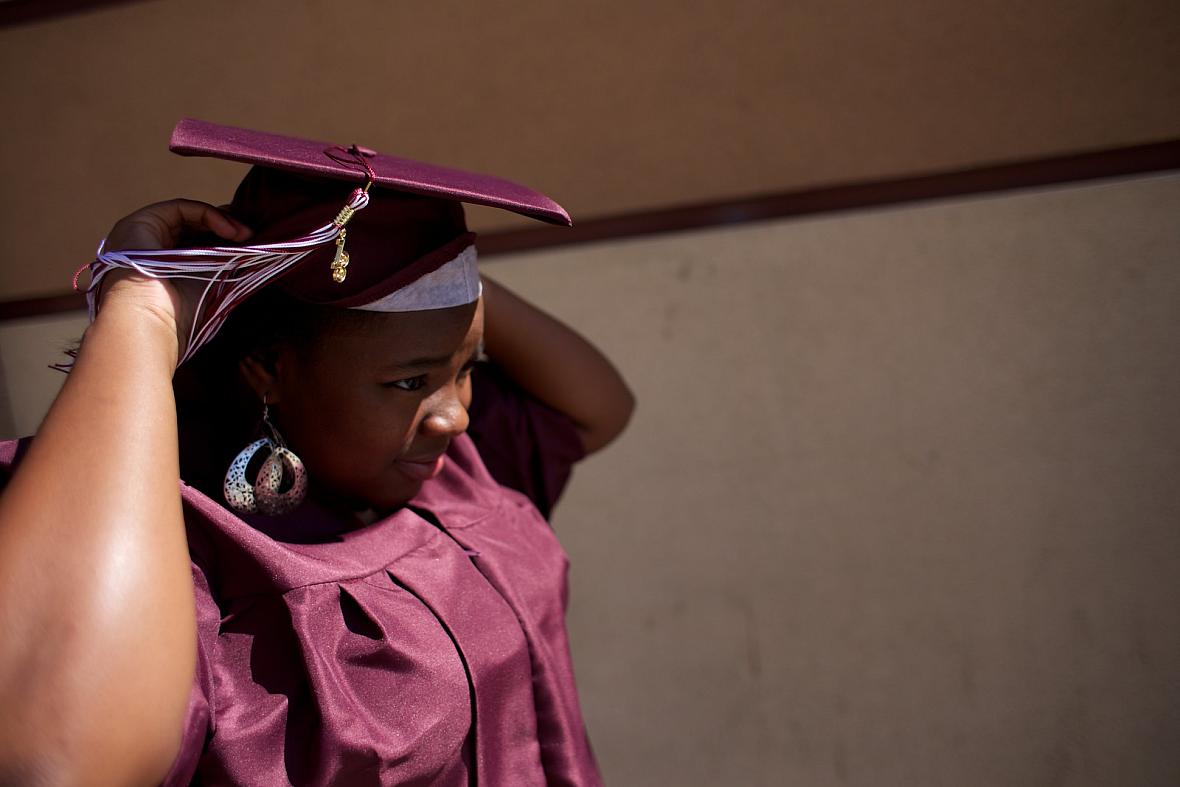
Unyque Jackson gets ready to walk the stage at her graduation.
Andrew Nixon/Capital Public Radio
This story was written by Julia Mitric.
HOPSCOTCH
Unyque Jackson started kindergarten in Oakland. Unyque Jackson with her daughter, Harmony. Andrew Nixon/Capital Public Radio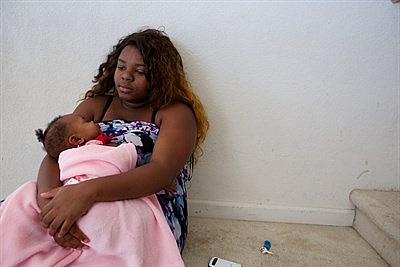
Her parents divorced when she was five. And Unyque moved to the San Joaquin Valley where she lived in her father’s house and was raised by her grandmother.
Over the next twelve years her father changed jobs frequently. And Unyque drifted in and out of ten different schools. She can’t recall all of them. But she remembers what was missing.
“I never got to have friends that I was in school with since I was little,” Unyque explains. “I never could get close to one teacher.”
By her junior year, Unyque found herself at McNair High School in Stockton, where she saw herself graduating. But there was still one more school transfer. And this one had nothing to do with her father’s employment.
Unyque was pregnant. And when she told her father, she recalls, “he was very harsh, because he didn’t think I was going to make it,” she recalls. “He was just like, ‘Oh, you gonna drop out. You ain’t gonna be nothing in life.’ Just a lot of hurtful things.’”
"I'm not going to stop doing what I've got to do." – Unyque Jackson
Seventeen. Bewildered. Pregnant. Unyque calmed her inner turmoil by imagining the consequences of dropping out.
Both of her older brothers failed to finish high school. She’d noticed other teens dropping out “because they got pregnant, chasing after a boy, or problems with the parents, getting kicked out of the house... and because drugs took over.”
But Unyque did not see her own pregnancy as a reason to drop out.
“I’m not the type of person that you can just tell me something negative and expect me just to drop out. I might shut down and not want to talk to you, but I’m not going to stop doing what I’ve got to do.”
JUST STILL LIVIN’
Unyque shares a photo of Will Pollard at the hospital, standing over their baby Harmony, smiling. The picture was taken moments after their baby’s birth in October.
When Will talks about his daughter, who’s almost one now, he says she’s just like him in some ways: doesn’t like to be awakened, doesn’t like to be kissed.
Will just turned twenty. He says he’s looking for a job. But, he has no high school diploma. And jobs do not come easy.
Will Pollard grew up in Detroit with his mother, brothers and sisters. Will Pollard holds his daughter, Harmony. Andrew Nixon/Capital Public Radio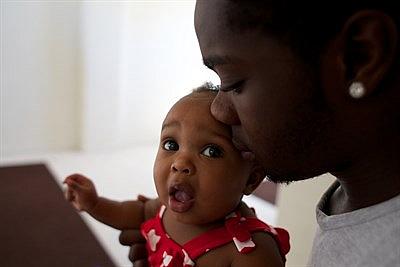
Of his school days, Will says: “I wasn’t really the school type. Me and my brother used to leave in the morning from my mom’s house and drive stolen cars to school, stay for maybe an hour or two and then leave...it had my adrenaline pumping...it was more interesting than sitting in school, reading books, writing paragraphs, essays...all that was boring to me at (that) point in my life.”
Will admits he struggled at school. And he says he did seek help a few times. But teachers explained things and when Will still didn’t grasp it, he says they both got frustrated. “I just felt like I failed, so I didn’t even try anymore,” recalls Will.
Will started skipping school, getting into fights. His mom relocated to Stockton. He was still stealing cars.
Of his family life, Will says “I don’t want to be dramatic or (tell) a sob story, but I never had a father.”
“Never had a father figure to drag me away like, ‘Come here, come with me. Stay off the cars. Let’s go do this.’ I actually had a father, but he wasn’t doing what he was supposed to do.”
Will says when his father did find him with a stolen car, he’d beat Will with a baseball bat.
About this time, Will’s mother Denise Pollard arrived in Detroit on a “crisis mission”. She found Will, marched him to the police station, filed papers declaring him incorrigible and took him back to Stockton to live with her.
After three years in Stockton, Will still hasn’t finished high school. He did attend a charter school in Stockton but dropped out after ‘a few altercations.’ Unyque became pregnant and Will got a job at Walmart. But he lost that job after ten months when he got into a fight with another employee.
Of his life now, Will says he’s basically “just still livin’.”
DO YOU WANT TO BE TIRED?
Not in school, not working. Summer’s slipping by.
"Do you want to be working at McDonald’s? When you’re uneducated, you’re a mule." – Denise Pollard
From Denise Pollard’s perspective, it’s clear what her son Will must do. First step, GED. Next step, vocational training or college. If Will doesn’t finish school, his mother sees a difficult life for baby Harmony and Unyque.
When Denise Pollard speaks, you listen. If you’re one of her ten children, you have definitely heard her speaking about education.
“I remind them how hard it was for me at first... ‘do you want to be working at McDonald’s? Do you want to be tired? Do you want somebody to work you like you two people because you’re uneducated up here? Then you’ll become a mule. That’s my attitude. When you’re uneducated, you’re a mule.’ ”
Denise Pollard works as a nurse's assistant at a nursing home in Stockton. Andrew Nixon/Capital Public Radio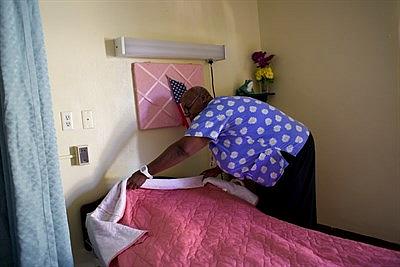
In Pollard’s eyes, everything starts and ends with education.
And for children to succeed at school, they need self-confidence, she says. Parenting is about loving your child and giving him or her the confidence to succeed.
Pollard’s parenting philosophy grew out of her own “hard times,” as she calls them with considerable understatement. She says her childhood was marked by neglect and abuse. Her mother was depressed; her father was not in the picture. When she was a child, relatives routinely told her she was “too big” and “too dark” to amount to anything. She recalls her grandfather telling her - when she was ten – ‘the only thing you’ll grow up to be is a prostitute.’
Within her family, Pollard’s education wasn’t discussed.
At fifteen she dropped out of high school. She did return to get her GED. But by then, she was having children. She says it took her decades to pursue her education beyond high school.
Denise says she’s desperate to help Unyque and Will avoid the life she lived: raising children in unsafe neighborhoods, surviving on meager wages in run-down housing.
Pollard has faith that education will change that future.
Education, education, education. “As long as I’m around...I’ll say it a thousand times. Every time you see me, I’ll say it.”
After Harmony was born, Unyque and her daughter moved into the Pollard home - with matriarch Denise, Will and several of Will’s siblings. Since then Pollard has been pushing Unyque, encouraging her to focus on finishing high school.
Pollard says she tells Unyque: “ ‘You’re at a stage in your life right now, (where) everything you do is going to show in your future.’ I said, ‘you’ve got from eighteen to twenty-five to go to college and get your degrees and start while you’re young. And then... you’ve got time to decide if you’re going to be something else that you want to retire at. I’ll be fifty years old. I’m just now living my dream. I busted my ass all those years, didn’t even try to get an education. I’m finally doing it, but look at this big circle I had to go around - because I’m older.’”
Pollard now works as a nurse’s assistant at a senior housing facility in Stockton. She’s renting a spacious house in a relatively stable neighborhood. Her front room has high ceilings - that’s a first. Pollard says, for the first time in her life, she’s at peace. She’s picking out paint colors and talking about laying down new carpeting, too.
Pollard says she’s looking forward to a good life for her children. She gazes at Harmony wobbling across the carpet toward her and says “This is my future.”
Still, she warns Will and Unyque, “I can’t want it more than you.”
BACK TO SCHOOL
Unyque remembers her first winter morning at Horizons. It was cold. It was dark. And she was nervous leaving her newborn baby with strangers.
Harmony was only ten weeks old. Unyque had been on maternity leave from McNair High School since mid-October. She had occasional family help taking care of Harmony. But in order for Unyque to go back to school, Harmony needed childcare.
Whether it’s a parent, a teacher, or a counselor, everybody needs somebody in their life. – Becky Beeman
Becky Beeman, Director of Horizons, in the nursery. Andrew Nixon/Capital Public Radio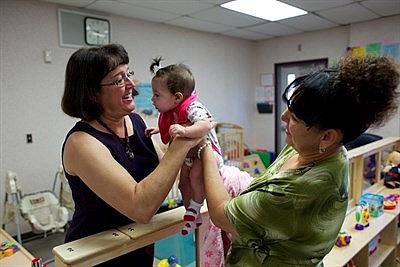
The Horizons program provides childcare, classes and moral support for pregnant and parenting teens who are continuing their high school education. There’s a nursery and a support center on the campus of Plaza Robles High School in the Lodi Unified School District.
Plaza is a continuation high school - geared toward students who’ve had serious academic problems. The school’s focus is credit recovery. Teachers work closely with students, pushing them to catch up on school work and earn the credits needed to meet graduation requirements.
Becky Beeman is Horizons’ director. She says putting Horizons at Plaza Robles makes sense. She teaches the pregnancy and parenting classes and, along with two other caregivers, takes care of students’ children. Beeman calls Horizons as “a place of respite.”
She says the young women coming to the program have survived emotional turbulence, even before pregnancy. Most are scared or overwhelmed. Some arrive at Horizons newly pregnant, Other teens are already parents. Beeman says she once had a ninth grader come in with a two-year old child in tow.
“A lot of the girls are coming in with broken foundations,” explains Beeman. “Meaning the people that were supposed to be in their lives and support them and give them love and attention were either missing or dysfunctional and not able to provide the love that they should’ve had - parental love.”
The moment Beeman met Unyque she says she saw a spark. “Unyque’s very bubbly,” says Beeman. “Somehow she hasn’t gotten beaten down along the way.” Beeman says it’s common for pregnant teens to be caught in a cycle of feeling worthless. Beeman believes helping her students gain a sense of self-esteem is a crucial part of motivating them to complete high school.
“I think...that’s what all the girls need,” explains Beeman. “Just somebody that can believe in them, that says ‘yeah, this is difficult and you’ve got a new challenge. You might have to go slower now. You know, you maybe can’t take as many classes at school...’”
But, she adds, “If they know that they can keep going and they should keep going, they can be successful. Everybody needs somebody like that in their life. And whether it’s a parent, whether it’s a teacher, a counselor, they need that support and that encouragement for them to keep going.”
Unyque and Harmony prepare to run some errands. Andrew Nixon/Capital Public Radio
But Unyque’s innate self-confidence couldn’t change the fact that she arrived at Plaza far behind in credits. To catch up, Unyque took tutorials and did extra credit projects in addition to her regular class work. After school, whenever Harmony napped or Will took her, Unyque says she’d plug in her USB thumb drive and do some homework.
But, no matter how hard she scrambled, Unyque’s stress kept her up at night. She needed two hundred and thirty credits to graduate and she didn’t know if she could earn them in time.
The thought kept coming back. “Am I going to make it?”
CONNECT THE DOTS
In the spring, Unyque stopped by counselor Sandi Warmerdam’s office for a check on her credit status.
“Once somebody becomes personal with me, I actually speak out more,” explains Unyque. “Like with Mrs. Warmerdam, I felt comfortable coming in here every day. (Asking) ‘How’s my credit looking?’”
Throughout Unyque’s odyssey of schools, she says she met teachers who didn’t seem to have a lot invested in their students. She found that her teachers rarely explained how she could improve her work. But at Plaza, Unyque met people who were willing to invest in her: Director Becky Beeman, school counselor Sandi Warmerdam and English teacher Marni Merin.
Having a family member or a special teacher who provides moral support can be a great help. But all of Unyque’s mentors say any strategy for keeping at-risk youth in school must involve more than one person. They say it’s about building a connective thread that runs through the student’s life at school and at home.
Instilling confidence. Building a support network. Connecting school and family. The people who try to save the future of at-risk students say those are the factors that will help a student finish school.
Warmerdam says the moment of dropout is a turning point - one that’s very hard to recover from.
“We don’t want to lose kids because lost kids become angry kids become kids who lose their motivation. If we can get these kids to stay in school, they stay motivated, energized. They get that impetus to go on. They get propelled a bit to be able to have dreams. You know, when you lose kids - you have to help them develop dreams. These kids? These kids still have dreams. They still think, ‘maybe there is a future out there.’
V IS FOR VICTORY
May 23: Plaza Robles High School graduation day. Unyque is backstage with the rest of the Class of 2013. They’re swishing their robes, fussing with tassels, antsy for the ceremony to begin. Their principal’s trying, without success, to get them lined up in alphabetical order for the procession.
The ceremony is lively and long. Horns blow, punctuating speeches from teachers and students. Unyque receives the ‘Award of Victory’ - for students who’ve tackled great obstacles on their path to graduation. Cheers rise up from siblings, aunts, uncles, cousins, parents and grandparents in the audience. It’s a big day.
Afterward, as the crowd spills down the steps outside the graduation hall, Unyque gets heartfelt hugs from nieces, parents, siblings.
As counselor Warmerdam points out, “It (may be) easy for college graduates to say, ‘what’s so hard about getting a high school diploma?’ But for a lot of our students, they’re the first in their families to even graduate high school. So, for them, it’s a huge moral victory.”
Both Unyque’s mother, Katharine and Will’s mother Denise are very proud of Unyque today. Pollard has been witness to the changes in the teenager since Harmony’s birth seven months ago.
Unyque with her daughter, Harmony. Andrew Nixon/Capital Public Radio
“You know, she learned a lot,” says Pollard. “She learned how to be a responsible parent. Time management. That’s the big thing - time management. And the focus: now you don’t have a choice. Before you know, we can lay around a little after we get out of high school. Now you ain’t gotta choice, you gotta keep it moving. Keep it moving. Ain’t no breaks.”
No breaks for Unyque after graduation. She plans to start in a Licensed Vocational Nurse program in June.
But on this graduation day, Unyque’s going back to the Pollard home to celebrate. Unyque laughs and says, “they said they were going to cook for me!” She’ll lounge on the sofa with Harmony, maybe watch some TV.
She imagines the next chapter of her life. “I’m going into the summer with a new spirit,” says Unyque. “I’m older, I have a baby, and I’m no longer in high school. You know, the world doesn’t look at me as a kid anymore, so I have to go into the summer with the mindset of an adult, I guess.”
RED LIGHT, GREEN LIGHT
Over the summer, Harmony started walking.
And Unyque’s plans changed. She says she missed the deadline to sign up for the LVN program in June. Instead, she plans to start in January 2014 when the next term begins.
Unyque found a summer job working for the Stockton Public Works Department through San Joaquin County WorkNet. She rides the bus to and from work. When work is done she goes home to spend time with Harmony and Will.
Unyque imagines her future. She’d like to start a college savings account for Harmony. In the next three years, Unyque would like to own a nice car.
But more than anything else, she wants to be living in a rent-to-own home with Harmony.
Same neighborhood, local schools. Unyque envisions Harmony someday walking on stage with kids she’s known since she was little. Unyque Jackson leaves the stage at her graduation from High School. Andrew Nixon/Capital Public Radio
Unyque has two younger brothers. The sixteen-year old has earned a 3.8 GPA. “He don’t want to be like my older brothers, thank God for that!” explains Unyque. And she thinks her brother is a good bet to break out of that family mold. She says their mom promised not to move out from the neighborhood till he finishes high school.
When her little brother found out Unyque really was going to graduate from high school, he told her, honestly, he was surprised. But he also said it made him feel like, “Oh, now that she did it, I can definitely do it - and nobody can tell me nothing different.”
Unyque smiles. “I guess me walking across that stage symbolized that you can do it too.”
[This story was originally published by Cap Radio.]
Did you like this story? Your support means a lot! Your tax-deductible donation will advance our mission of supporting journalism as a catalyst for change.

